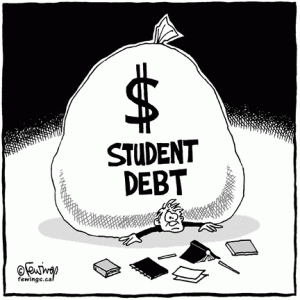
Don't worry everyone is doing it!
In a recession, is college worth it? The risk of debt may change some students’ plans.
Danielle Claussen, 18, acknowledges she didn’t give much thought to the ultimate cost of college when she enrolled at Fairleigh Dickinson University in Morris County, NJ.
“My plan is to attend for four years, like my sister did,” says Claussen, who grew up in Tuckerton, a small suburb town in South New Jersey. Because she didn’t qualify for financial aid, she took out student loans. Set to graduate in 2012 with a major in nursing and an estimate of more than $70,000 in debt. Claussen adds, “With my brother and sister currently in college before me, it’s hard to pay for me and taking out loans is really the only way.”
It is not uncommon for new students to take out loans to pay their way through college. However, the availablility of some institutions’ scholarships and grants are decreasing, therefore increasing the amount of loans taken out.
Almost as far back as the new generations can remember, a ray of light in this country has been that a college degree means a better life. Many hold on so dear to this belief that nearly countless students, such as Claussen, borrow tens of thousands of dollars to attend prestigious public or private universities. Yet as this, the worst recession since the 1940s, enters into yet another month, many graduates are discovering that the fruits of their student labor could be a long time coming.
At the same time, prospective students are abandoning their “dream schools” in favor of more affordable options, forcing many colleges to work harder to amend their tuition and fees.
Unlike unemployed high school graduates, many unemployed college graduates face the additional burden of student loan payments. Two-thirds of bachelor’s degree recipients last year graduated with an average debt of about $23,000. Total debt for borrowers with graduate or professional degrees ranges from $30,000 to $120,000. New graduates come face-to-face with today’s unforgiving job market. Employers expect to hire 22% fewer 2009 graduates than they hired from the class of 2008, according to the National Association of Colleges and Employers.
The current fluctuating state of our economy has begun to seriously affect the decisions that students and their parents will make.
Community college enrollment is soaring. More than 90% of community college presidents said enrollment was up in January from the previous year, and 86% reported an increase in full-time students, according to a survey by the Campus Computing Project, which studies the role of information technology in higher education. Some students have elected to start by enrolling in Commnity College to earn their Associate’s Degree while living at home. Following, they will enroll in a traditional college to continue their education. This would earn the student their Bachelor’s Degree while cutting down the cost of education, and in most cases lowering possibly eliminating debt after graduation.
Students who attend traditional four-year colleges have become more dilligent when it comes to costs and fees. More than two-thirds of students who applied for college this spring said the economic downturn affected their choice of colleges, according to a survey by the Princeton Review. The survey also found “a great concern around financial aid,” with 85% stating that they wouldn’t be able to afford college without it, says Robert Franek, vice president of publishing, for the Princeton Review.
Likewise, 70% of high schools reported an increase in students who said goodbye to their “dream schools” in favor of more affordable options during the 2008-09 school year, according to the National Association for College Admission Counseling. More than 65% reported an increase in students applying to a state colleges instead of private ones. Nearly one-third of private colleges expect freshman enrollment to decline in the next year.
College financial aid specialists suggest students should take a hard look at average salaries in their chosen profession before taking out student loans, saying if you think you want to be a first-grade teacher, you should be more hesitant about borrowing than if you think you’re going to be an engineer.
A recent survey of students ages 22-26 says that if they had the chance to do it all over, they would have taken a year off to figure out what they wanted to do with their lives before attending college. Many kids do not know what they want out of college education, so now it is suggested among peers to take a break and get to know yourself a little more, before spending thousands of dollars on an education.
Few would argue that college is a bad investment, but the present economic state could change the value of that investment. Students graduating during a recession tend to start at smaller companies or lower-paying firms, forcing them to change jobs more frequently than students who graduate in better times. The debate over the expected payoff after debts is still up in the air, but there still are countless believers in ‘the old college try’. Even if it requires the helping hand of financial aid.
To find out more about financial aid, visit www.Finaid.com